- Home
- Douglas Clegg
Nights Towns: Three Novels, a Box Set Page 4
Nights Towns: Three Novels, a Box Set Read online
Page 4
Joe's wife smoothed the map out on her lap. "Seven miles? Maybe?"
Joe looked at the rounded hills, and the blue-gray valley. "You can always smell it before you step in it. That's what old Hop used to say."
"Oh," his wife said, faking a laugh.
"I know, I know," Joe grinned, "I should be more... forgiving or something."
"Mr. Cynical, right, Mom?" Aaron said, leaning forward, resting his chin upon the back of the front seat, between his father and mother.
Joe glanced at his son in the rearview mirror. The kid looked like his mother; neither Hillary nor Aaron got Joe's dark hair, or eyes, or the little ridge to his nose. Thank God for that. He was always afraid that a daughter of his would inherit that nose and feel forever cursed because she didn't get her mother's slightly turned up nose that was so WASP-perfect-to-form that sometimes it was hard to tell she had an ethnic heritage at all.
He looked back at the road; it narrowed and curved, and he had to slow down some, until finally the two lanes melted to one lane, with a sign on its edge.
"What's that mean?" Aaron asked, pointing to the sign. He sometimes got things backward—Joe didn't like to think it might be dyslexia. He preferred to think it was some kind of originality or creativity; but it worried him, his son's inability to read well. He was bright in other respects, everything but reading. "Y-eye-old?"
"It means to let someone else go first. Like being polite," Joe's wife said. "It's pronounced 'yield,' like 'field.' Y-I-E-L-D."
"Keep going, teacher-lady," Joe said, quoting from an old movie. He raised his right arm and rested it along her shoulders. She leaned into him.
After what they'd been through, it amazed him, sometimes, how a simple touch was like healing.
And then, Joe stopped the car.
He didn't realize that he'd already begun shivering.
His wife said, "Honey? We can go—there's no one else on the bridge. Joe?"
But the world's sounds drowned for a moment or more and Joe felt as if he were not at the edge of a bridge, but beneath frozen waters.
Someone whispered in his ear, "Joe? Is that you? Joe?"
It was a girl's voice.
It was as if someone had switched on some juice and sucked Joe back into the vacuum of memory.
To a special time in 1978, when he was eighteen.
5
What is it you want the most? Money, love, fame, happiness? Make your choice, you only get one. Make it, and blow out the candles, spin the wheel, say the prayer. You only get one of them, so make it last.
What is it you want the most?
My name's Fate, Mister Fate to you, children, and whatever it is you want the most, make sure...
Very sure...
Because I'm gonna make sure it's the one thing you never get.
6
He was just eighteen and he had a Ford Explorer, bought cheap from a man in Stone Valley for six hundred bucks. The truck was what was called Ford Yellow, and was dented in three places, but Joe was going to hammer the dents out and maybe clean up the transmission some, and replace the left headlight, which was chronically dark.
Seventy-eight was shaping up into a good year for him in most ways, at least in the ways that counted. Back then, he was a smart boy even though he had dropped out of high school in the middle of his junior year to work in his father's garage full-time. Grades were never a problem: he aced the classes he enjoyed and flunked what bored him (including chemistry, geometry, and Phys. Ed.) His father had never finished high school and had never, in his own words, "given a rat's ass goddamn" about education, higher or lower. Joe's mother was furious at both her husband and Joe, but Joe had plans that involved money, and his father was paying him top dollar for Colony, West Virginia, in 1978, a good seven dollars an hour, more than he'd make in the furniture factory, more than he'd make if he went all the way to Charleston with his limited talents and his ambition of being a writer.
Joe figured that he'd get his diploma by hook or by crook somewhere down the road. Writers didn't need educations, anyway. What did Shakespeare need with an education? Or Jack Kerouac? Or John McDonald? Or anyone who wrote a half-decent sentence?—such were his arguments when he turned seventeen. It was hard enough listening to Bruce Springsteen records all the time and feeling like that, like he just wanted to get Melissa and have her wrap herself around his engine and take off—well, sometimes living in Colony was like living in hell, and did Bruce Springsteen have to go get a bachelor's degree to write "Born To Run"? Somehow, Joe doubted it. These arguments had soured in his mouth by the time he was eighteen, and watching his buddies graduate from Colony High, while he went back to being a grease monkey, and Hopfrog Peterson, that son of a gun, was even going all the way to Morgantown for college, while Joe—who knew in his heart he was smarter—was going to be stuck in Bumfuck, Egypt, for the rest of his life, saying, "Regular or unleaded?" and "Check under the hood, miss?"
But he had done it all for Melissa.
Sweet Melissa.
He had been in love with her since sixth grade, and he would love her until the day he died.
And she loved him, too.
Neither could wait until they got married.
Couldn't wait.
Had to get married as soon as they were both on their own.
Melissa's family wanted her to go to college, too, but she wanted to marry Joe, and he loved her more than life itself.
That's really the start of trouble in life: when you can't wait for something, particularly love.
In a town like Colony, patience was not only a virtue, it was a requirement.
It had taken nearly a hundred years for the town to call itself a town.
What would four more years be? That's what Melissa's dad wanted to know.
But to Joe Gardner who had carved JG LOVES MW TO DEATH on an oak tree near the old quarry, and to Melissa Welles, time was the enemy. Everything was NOW NOW NOW.
7
"What do you know about love? Either one of you?" Gary Welles said. Melissa was upstairs, hiding, embarrassed probably that her father was taking this new tactic in dealing with Joe. Gary ("Mister Welles to you, boy") stood in the doorway of his house, his hands akimbo on either hip, his legs braced as if waiting to get socked in the jaw.
And sometimes Joe wanted to sock him, too, because he was the kind of bully that Joe had hated all his life. Joe wanted to tell him that he knew why Melissa's mother sometimes had bruises, or why her little brother Gordon was practically autistic at thirteen; but he only wanted one thing, to see Melissa, and he knew that getting in a fight with her father wasn't going to help anything.
Besides which, Joe wasn't much for a fight—not that he'd ever been in one to know, but no matter how often his own dad pulled him aside to teach him how to box, he just never got the hang of it.
But Joe had size on his side. At eighteen, he was six foot three, his shoulders were broad, if often slumped, and he projected strength.
Melissa's father, on the other hand, was small and wizened, which made it all the more maddening when Joe thought of the guy beating up on Melissa's mother.
"Love," Gary Welles said, continuing the lecture. "Love isn't this kissy-flower-steam-the-car-window-at-the-drive-in thing like you kids think. It's commitment and security and care and service. It's raising children with the right morals and values."
"Okay, Mr. Welles, I get your drift," Joe said. "But how old were you when you got married?"
Gary Welles narrowed his eyes as if trying to avoid some verbal trick. "Nineteen."
"And Mrs. Welles?"
"Well, sour owl dung, boy, you can't compare Mrs. Welles and me marrying in 1949 with you two. Things were different then. The war helped us grow up fast. I had a steady job, I was able to support a wife."
"I can, too. I make enough, and I'll take another one on weekends, if I have to."
"What about college, boy? Melissa's going to go to college. I ain't gonna have some pregnant girl running
back here because she can't do nothing herself. My wife and me, we want something more for her than wife to a grease monkey. We want her to get up in the world."
"You mean you want her to marry up, don't you?"
"I didn't say nothing of the sort."
"You want her to go to college, not so she can learn something, but so she can marry a premed student or someone who's gonna be a lawyer, or something. You think just because of my mother that I'm white trash or something."
"No, boy, you got me all wrong."
"My mother is a good woman, Mr. Welles." Joe felt he was lying.
Gary Welles seemed like he was about to say something, then hesitated. Slowly, he said, "I won't argue with you there."
Joe shut his mouth. He wanted to open it and start up again, because this guy really set him on edge, but he knew it would end in a spitting contest, and all that would happen would be that Gary Welles would be further convinced that Joe Gardner was not suitable for his daughter's hand.
Gary went and stood on the edge of the wraparound porch. The few streetlamps haloed the antebellum houses on Stonewall Avenue; the lights were yellow, and buzzed slightly, to the point that Joe often thought they were going to explode sometimes. You could hear the crickets and locusts, all maracas in the trees, and beyond them, the ocean-wave-crashing sound of the big trucks on the mountain pass, their horns, too, like the cries of whales in mating fever, calling out to each other in darkness.
Gary Welles drew a cigar from his breast pocket. He always wore three-piece suits, even on the sultriest of nights, as this one was; there were clearly blotched islands of sweat beneath each armpit. Mr. Welles was a salesman for Colony Furniture and, although the sales force was known as stupid and deceitful, it was Mr. Welles who headed the northeast region, the biggest sales territory of all, and so, to his face, in town, he was kowtowed to; you couldn't risk offending the man who was so good at getting rich idiots in New York, Boston, and Washington, DC, to fork over hundreds of dollars for what amounted to an eight-dollar rocker, mass-produced, and hit several times with a lug wrench to antique it.
"So, Gardner, Joe, boy, wouldn't you be happier if Melissa got out of this hole and lived a better life?" Gary Welles smoked his cigar. For a moment, Joe felt that he'd let his guard down.
"Yeah. Yes. But I think I can be part of it." The man turned to face him, smiled kindly, reached over and patted Joe on the shoulder, drawing Joe towards him with a slight pressure. Joe stood beside Melissa's father.
He said, "Joe. Let me tell you about myself. Let me tell you about a man who was once a boy like you, fresh from the Good War, come back home to marry his sweetheart. How I bled my knuckles carrying Colony rockers door-to-door, was up by four a.m. to catch the train up to the cities. How I sacrificed everything for my family. And the big question, Joe, always is, my boy, was it worth it? Was all that doing without and sleeplessness and fingers to the bone bullshit, was it really worth it? And you know the answer." Long puff on the cigar, stinking smoke coming at Joe, making his eyes water. "You know the answer?"
"I guess."
"I don't think you do, Joe. I think kids today are too young. The answer, boy, isn't yes. Just the opposite. If I had it to do over again, I'd have waited. I'd have courted Melissa's mama another three, four years, when I had some savings, when I could devote time to a family. She would've waited. When a woman loves you, Joe, she waits. When you love someone enough to let her pursue her dreams, trust me on this one, Joe, you'll wait. What's a few years if love is eternal?" Gary Welles looked Joe in the eyes and blew smoke at him. Joe's eyes teared up as much from the smoke as from the sentiment.
From behind both of them, Melissa's voice: "Damn it, Joe, don't you listen to him." And before Joe could turn, there she was, in her button-down shirt and jeans and penny loafers—she grabbed his arm and tugged him almost halfway down the porch stairs. "Let's get the hell out of here," she whispered, and turned and shouted to her father. "Will you quit it with your poison for once in your life?"
8
They made love in the bed of his truck, something that was still a mystery to him, an article of faith, a marriage vow, unbreakable, unstoppable (and insatiable, most of the time). Her body was sacred and he took their communion more seriously than most teenagers. He took care that she had as much pleasure as possible, that she felt at least as much as he did, which was all shivers and gasps. There was a lot of fumbling, but it was sacred fumbling. He had never made love to another girl and never wanted to. He would spend the rest of his life with her and he would make sure she was the most fulfilled, happiest woman on the face of the earth. He was a Man now, and she a Woman, and the world was their Eden. People like her father were too old to understand about real love, about how sex bound two souls, how the very act of making love was the one seeking and finding its other half. Older people had lost that, people like his mother and father, they had betrayed their pure spirits long ago, they had perverted their love. But it was different with Melissa, it was like touching an angel. He savored the feeling when he was inside her, albeit with the Lambskin Trojan on, even then the feeling was of connectedness and pleasure and fire—God, he couldn't take it for long, but he had to, he had to for her.
When it was over, he kissed her sweetly, brushing the hair from across her forehead.
She grinned, whispered something, and put her jeans back on. It was nearly midnight. They had to flip coins as to whose music got to play on the tape deck. Melissa usually won. She wasn't a Springsteen fan and so the damned soundtrack from Saturday Night Fever kept playing in the background. He heard those high-pitched Bee Gees every time he felt himself about to really let go and enjoy the moment, so it was just as well they were in the back of his truck and not somewhere more comfortable—disco never was really great make-out music, as far as he was concerned (but most of the time, he just covered his ears and pretended he was listening to the Boss singing about getting out of some pissant burg).
Afterward, he almost laughed. "Hell, kill me," Joe said, smiling. "Your dad's gonna kill me."
"He will if he sees us like this," she said, brazenly jiggling her breasts.
"Melissa Welles, you stop that," he said, but couldn't help laughing.
"After sex, you're shy. You weren't so shy an hour ago."
"And you're a quick learner. I always thought boys were hornier than girls."
She shrugged. Snapped her bra back in place and slipped into her shirt. "The famous Myth of Manhood. Or maybe I'll make that page one hundred two in the book, The Myth of Joe Gardner."
"So," he looked at her sidelong, leaning back on his elbow, "which chapter of my novel do you want to be?" He was in no hurry to dress; he thought he might look desirable to her, there, naked, in the moonlight, in the truck, even with the mosquito bites on his ass.
She leaned forward and kissed him on the forehead. "Every chapter, Joey. But no more myths, okay? I want us to get married soon. I love you and I don't care what Dad thinks about it."
"Are you sure he wasn't right about getting out of Colony?"
"Well, we can both get out. We'll manage. I've got my savings, and you've got some money. I think we'll do okay."
"And college?"
"I'll go at night or something. All I know is, I love you and I want us to be together." She kissed him harder. He felt the blood start to rush to his lower organs, followed by that awful and wonderful hormonal tide rising up, unbidden.
As they resumed their lovemaking, in which Melissa kept her bra and shirt on but removed her jeans again, Joe wondered if she really loved him or was just a sex fiend.
She whispered, "Day after tomorrow, we can go over the mountain and get married in Stone Valley. Daddy won't have to know 'til it's too late."
Joe said, like a train picking up speed as it comes out of a station, "YES I LOVE YOU OH GOD MELISSA I LOVE YOU YES."
The night was endless, the love was strong and beautiful, but something buzzed around his brain in the early morning.
What is it you want most, kids?
Love? Happiness?
What is it you believe in?
Love? Is that it, Joe? Love?
I'll take it from you. I'll blow out that candle for you, Joe, my boy, and every time you light another one, I'll snuff it, too.
9
Hopfrog Petersen became best man by default. Melissa and Joe didn't want anyone to know who might tell on them and Hopfrog, for all his winning looks and natural charm, had alienated himself from most of the town well before eighteen.
"Actually, Hop," Melissa said, giving him a hug, "you're a very good man, but I hope I'm marrying the best man."
Hopfrog shrugged. "Remains to be seen, man." Hopfrog had started calling everyone "man" since he'd tried marijuana off in one of the cornfields with the Heads from school. He was going through something of a cool phase and Joe was a little unnerved by his bouts with drugs and booze. Hopfrog had even, it was rumored, tried LSD once, which was way out of the league of even the druggiest high schoolers of Colony, but some kids thought he was lying about the "tab" which sent him "flying" to a place where the world was a "magic carpet ride." Hopfrog's hair was a little too long, his clothes a little too tie-dyed, and his reading matter a little too William Burroughs. Hopfrog had gone to weird, in Joe's opinion, since about eighth grade or so.
It was the morning of graduation and while Melissa's folks were going to the ceremony, expecting her to be there, as she was practically the "fucking valedictorian," as she said in her crude language, she was instead running off with Hop and Joe to Stone Valley to see the justice of the peace.
Hopfrog had a VW bug left over from 1969 with flower power decals and upside-down flags and peace signs painted sloppily on the hood. He'd bought it in Blacksburg, Virginia, for two hundred bucks and a bag of weed. It ran as if it were, itself, stoned, if it ran at all. Joe was ready—he'd dressed up in a navy sport coat and khakis, his shoes were shined, and his hair was cut. He stood with Hopfrog, waiting for Melissa, tapping his foot, shifting his weight from one foot to the other, wondering if he should smoke a cigarette just to calm his nerves.

 Mordred, Bastard Son
Mordred, Bastard Son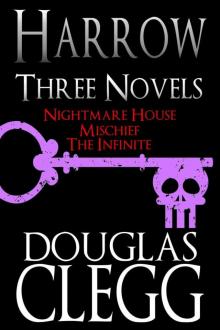 Harrow: Three Novels (Nightmare House, Mischief, The Infinite)
Harrow: Three Novels (Nightmare House, Mischief, The Infinite)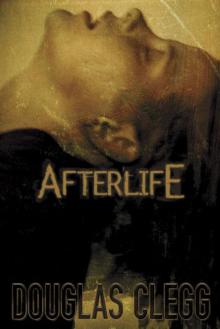 Afterlife
Afterlife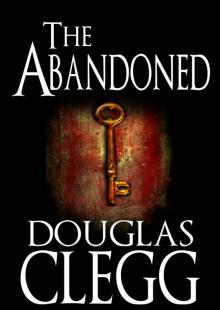 The Abandoned - A Horror Novel (Thriller, Supernatural), #4 of Harrow (The Harrow Haunting Series)
The Abandoned - A Horror Novel (Thriller, Supernatural), #4 of Harrow (The Harrow Haunting Series) The Queen of Wolves
The Queen of Wolves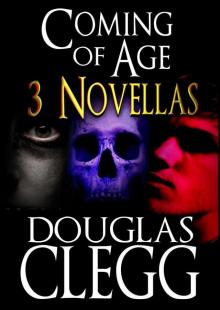 Coming of Age: Three Novellas (Dark Suspense, Gothic Thriller, Supernatural Horror)
Coming of Age: Three Novellas (Dark Suspense, Gothic Thriller, Supernatural Horror)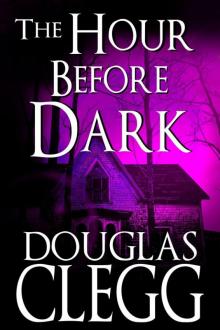 The Hour Before Dark
The Hour Before Dark Isis
Isis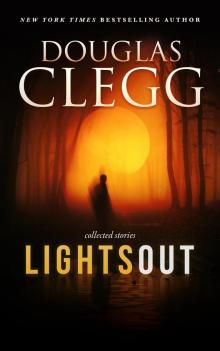 Lights Out
Lights Out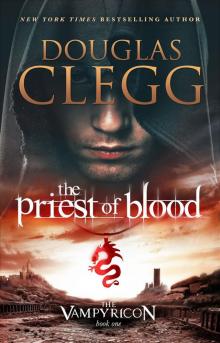 The Priest of Blood
The Priest of Blood Criminally Insane: The Series (Bad Karma, Red Angel, Night Cage Omnibus) (The Criminally Insane Series)
Criminally Insane: The Series (Bad Karma, Red Angel, Night Cage Omnibus) (The Criminally Insane Series) Halloween Candy
Halloween Candy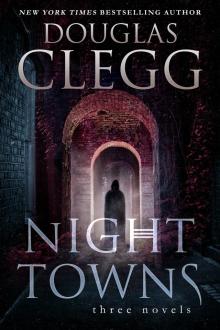 Nights Towns: Three Novels, a Box Set
Nights Towns: Three Novels, a Box Set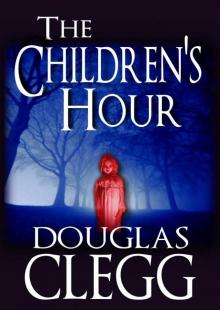 The Children's Hour - A Novel of Horror (Vampires, Supernatural Thriller)
The Children's Hour - A Novel of Horror (Vampires, Supernatural Thriller)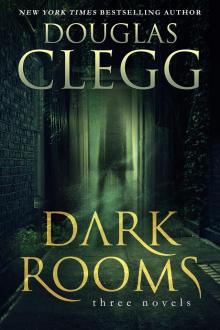 Dark Rooms: Three Novels
Dark Rooms: Three Novels![[Criminally Insane 01.0] Bad Karma Read online](http://i1.bookreadfree.com/i2/04/10/criminally_insane_01_0_bad_karma_preview.jpg) [Criminally Insane 01.0] Bad Karma
[Criminally Insane 01.0] Bad Karma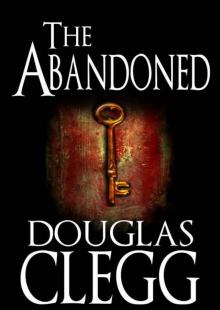 The Abandoned - A Horror Novel (Horror, Thriller, Supernatural) (The Harrow Haunting Series)
The Abandoned - A Horror Novel (Horror, Thriller, Supernatural) (The Harrow Haunting Series) Halloween Chillers: A Box Set of Three Books of Horror & Suspense
Halloween Chillers: A Box Set of Three Books of Horror & Suspense